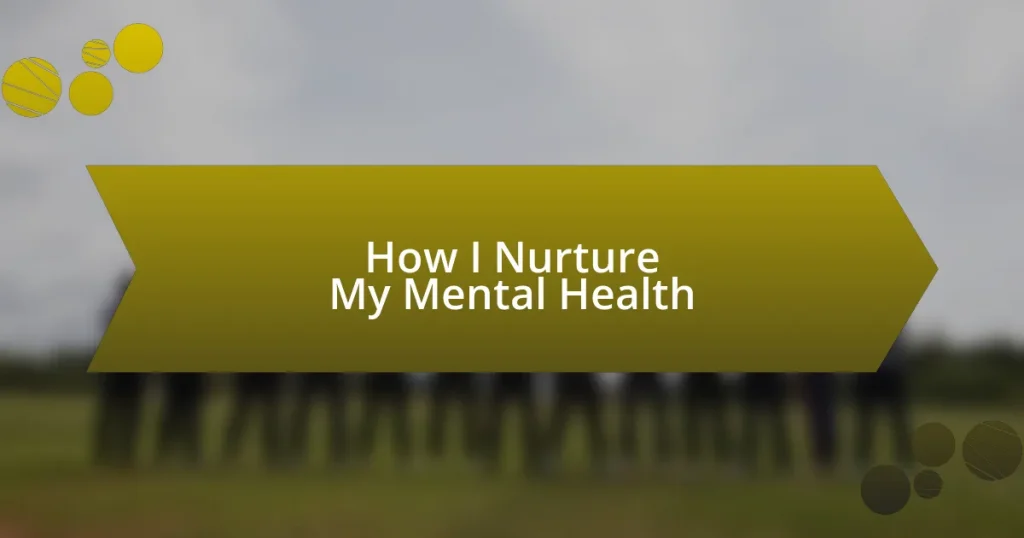Key takeaways:
- Mental health is critical for overall well-being, and early recognition of challenges can lead to better outcomes.
- Establishing a daily routine and allowing flexibility can enhance mental health by providing stability and reducing anxiety.
- Incorporating mindfulness practices, such as journaling and meditation, helps in emotional clarity and fosters gratitude.
- Building a supportive network through vulnerability and small gestures can significantly reduce feelings of isolation and strengthen relationships.
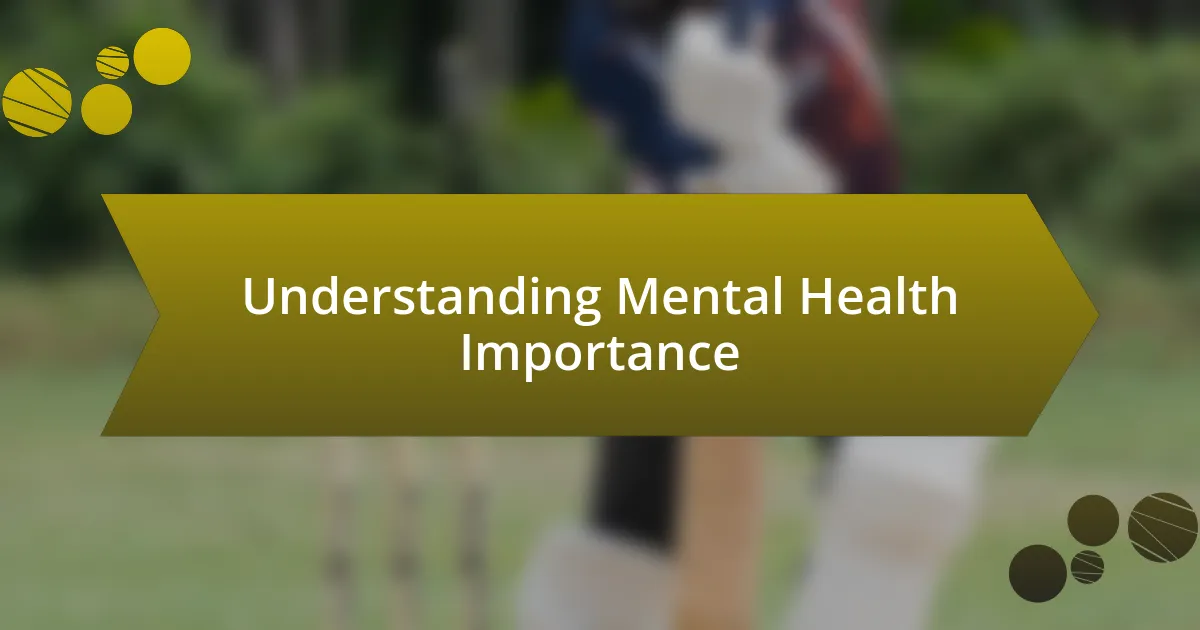
Understanding Mental Health Importance
Mental health is often an overlooked aspect of our overall well-being, yet its importance can’t be overstated. I remember a time when I brushed off my feelings, thinking they were just temporary. This mentality changed when I realized that ignoring mental health issues often leads to deeper struggles down the line. Have you ever found yourself feeling overwhelmed and not knowing why? It’s crucial to recognize these feelings early on and acknowledge that they are valid.
Understanding the significance of mental health helps us foster resilience in the face of life’s challenges. I’ve had moments when stress felt insurmountable, and I realized that cultivating a supportive environment—whether through friends, family, or even professional help—made all the difference. It’s a bit like tending to a delicate plant; without the right care, it’s bound to wither away. How often do we nurture our thoughts and feelings as seriously as we do our physical health?
By prioritizing mental health, we empower ourselves to live a more balanced and fulfilling life. In my own experience, making time for self-reflection and activities I enjoy has created a constructive outlet for my emotions. What if we embraced the idea that mental health is just as important as physical health? Embracing this mindset can open up new pathways for growth and happiness in our daily lives.
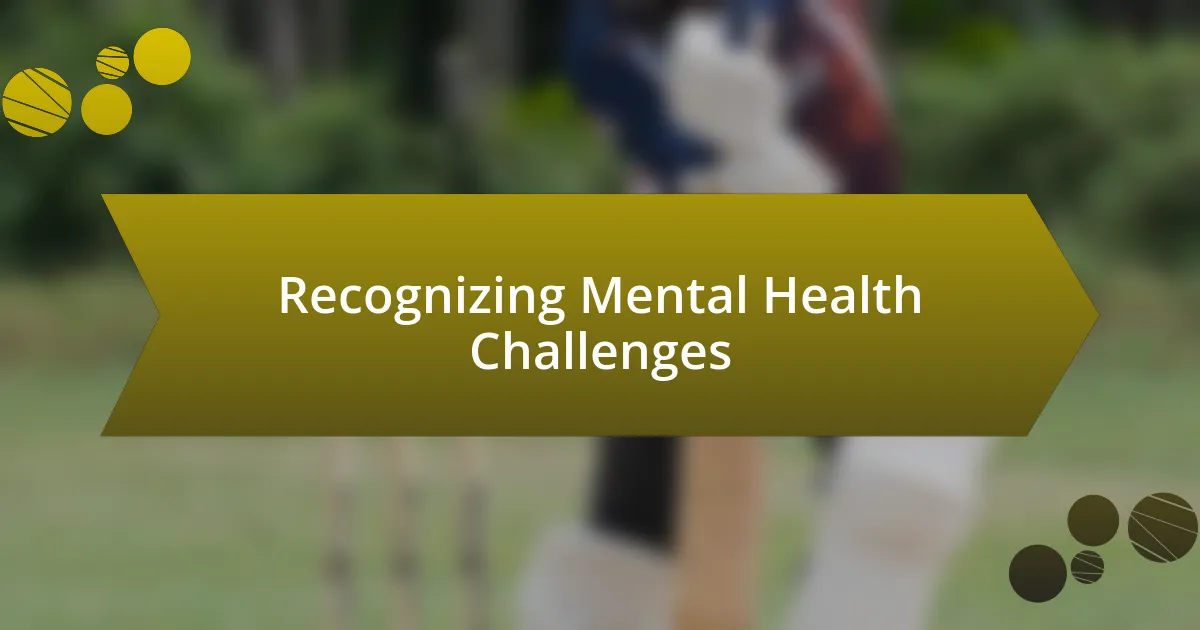
Recognizing Mental Health Challenges
Recognizing mental health challenges is not always straightforward. I recall a time when signs crept up on me: mood swings that seemed to have no cause, a persistent feeling of sadness, and difficulty concentrating. It’s easy to overlook these feelings as just part of life, but acknowledging them is the first step toward clarity and healing.
Consider these signs that indicate potential mental health challenges:
– Persistent sadness or anxiety that doesn’t seem to fade
– Changes in appetite or sleep patterns
– Withdrawal from friends, family, or activities once enjoyed
– Difficulty focusing or making decisions
– Emotional numbness or feelings of hopelessness
Being aware of these indicators has been pivotal for me. When I started paying attention, I could recognize when something wasn’t quite right, prompting me to take necessary action—whether that meant seeking support or diving into activities that uplifted my spirit. It’s about tuning into ourselves, a practice that leads to better mental wellness.

Creating a Daily Routine
Creating a daily routine has been a game-changer for my mental health. I remember when my days felt chaotic, leading to overwhelming stress. By establishing set times for work, meals, and relaxation, I found a comforting rhythm that transformed how I approach each day.
Incorporating small rituals into my routine can make a difference in my mood and energy. For instance, I love starting my morning with a few moments of mindfulness. This simple practice grounds me and sets a positive tone for the hours ahead. I’ve found that just a few deep breaths can create a calming space, allowing me to tackle tasks with a clearer mind.
I’ve learned the importance of flexibility in my routine, too. Some days, things don’t go as planned. Instead of feeling defeated, I adjust my schedule with grace, reminding myself that self-care is about progress, not perfection. Embracing this mindset not only reduces anxiety but also fosters resilience, helping me face challenges with a more optimistic outlook.
| Aspect | Structured Routine |
|---|---|
| Benefits | Provides a sense of stability and predictability |
| Flexibility | Allows adjustments without guilt, promoting adaptability |
| Mindfulness | Incorporates moments of reflection to enhance awareness |
| Balance | Encourages time for work, self-care, and relaxation |
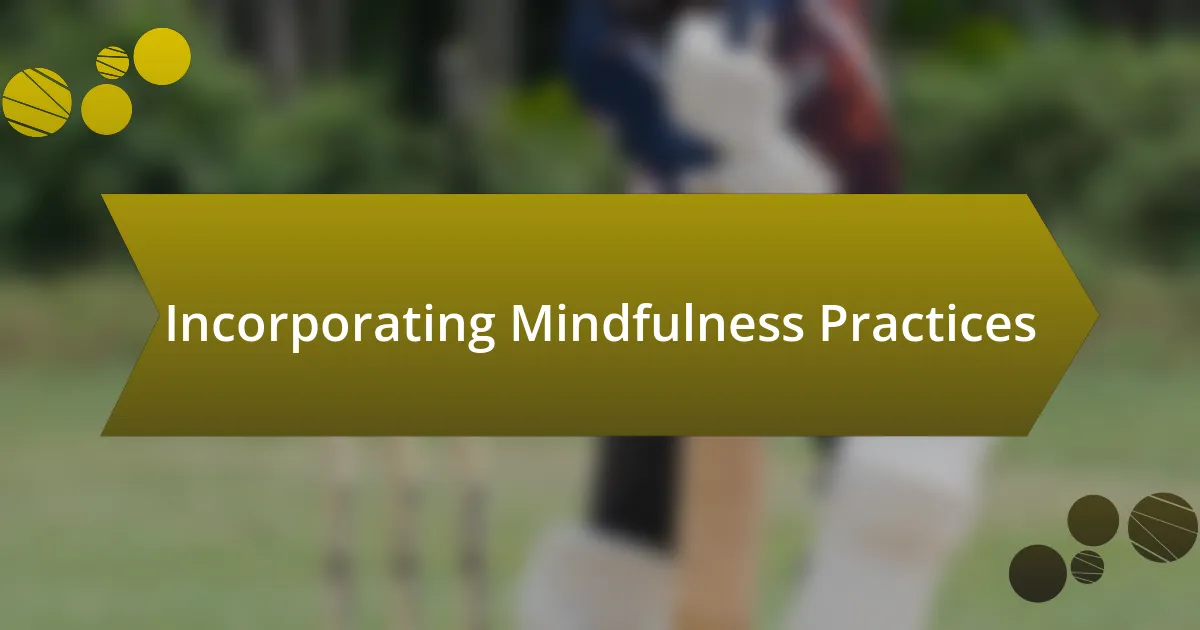
Incorporating Mindfulness Practices
Incorporating mindfulness practices into my daily routine has truly enhanced my mental health. One of my favorite methods is the five-minute meditation I do right before bed. It allows my thoughts to settle, and I can’t help but wonder how much more at peace I feel afterward. I often drift off with a sense of calm that used to elude me.
I also try to infuse mindfulness into ordinary activities, like when I wash the dishes. At first, I would rush through the process, but now I focus on the feel of the warm water and the sound of the plates clinking together. Engaging my senses in this way transforms a mundane task into a moment of presence. Can something as simple as doing dishes shift your mental state? I’ve found that it can.
Additionally, I’ve started journaling my thoughts as part of my mindfulness practice. This act of writing helps me reflect on my day and identify patterns in my emotions. It’s fascinating to see how putting pen to paper can clarify my feelings and inspire gratitude. The connection between mindfulness and journaling has become a cornerstone of my approach to maintaining mental well-being.
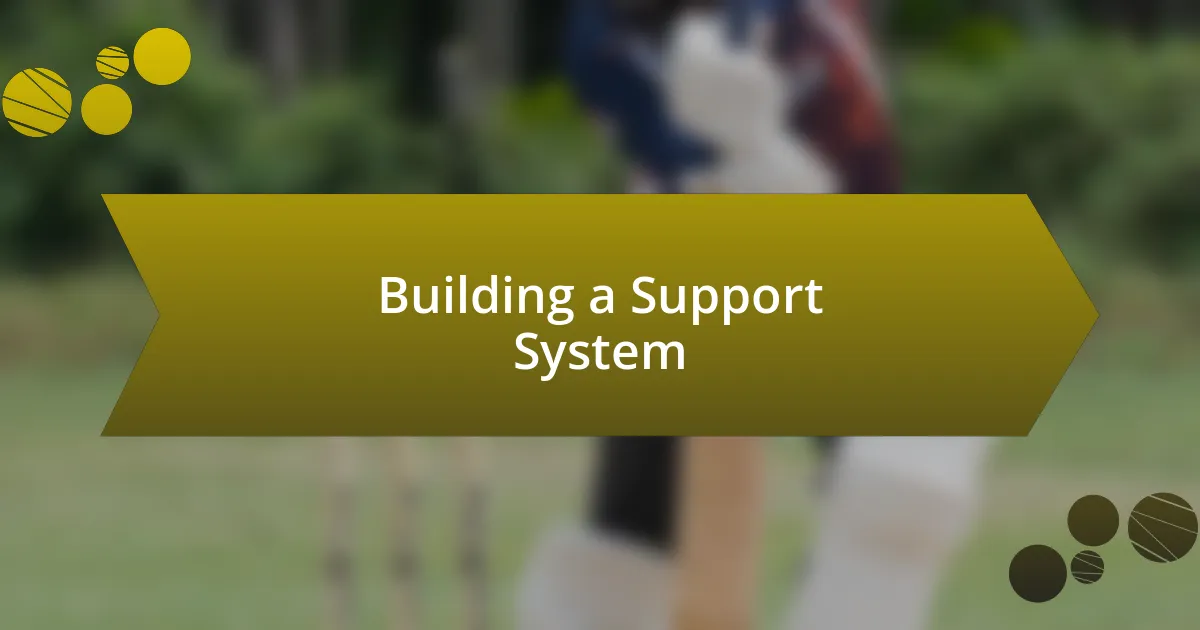
Building a Support System
Building a strong support system has been a vital part of my mental health journey. I’ve learned that surrounding myself with understanding and empathetic individuals makes a world of difference. When I faced tough times, reaching out to friends who genuinely listened helped me feel less isolated. Have you ever noticed how sharing your thoughts with someone can lighten your emotional load?
One of the most comforting aspects I discovered is the power of vulnerability. I remember one evening, when I opened up to a close friend about my struggles with anxiety. Instead of dismissing my feelings, she shared her own experiences, creating a safe space for both of us. It struck me then that being vulnerable not only strengthens our connections but also nurtures my sense of belonging.
Fostering relationships doesn’t always have to be a huge effort; small gestures matter too. Sometimes, I find myself sending a quick message to check in on someone, just as a reminder that I’m here. These little moments can deepen bonds and build trust over time. Have you ever reached out unexpectedly to someone you care about? I can attest that it can rejuvenate not only your relationship but also your own spirit.

Engaging in Physical Activity
Engaging in physical activity has become more than just a routine for me; it’s a crucial component of my overall mental health strategy. Whenever I lace up my sneakers and hit the pavement, I feel an immediate shift in my mood. The endorphins released during a brisk walk or a spirited jog are like little bursts of joy that kiss away my stress. Have you ever noticed how a short workout can elevate your spirits almost instantly?
One vivid memory stands out: one particularly gloomy day, I decided to try yoga for the first time. As I moved through the poses and focused on my breath, I felt the weight of my worries begin to dissipate. It was as if each stretch was pushing out negativity, leaving room for positivity. That experience taught me that physical activity isn’t just about getting fit; it’s also a powerful tool for clearing mental fog and fostering emotional clarity.
I genuinely believe that finding the right activity can be transformative for one’s mental state. For me, cycling through the park has become a cherished escape. The wind against my face and the rhythmic pedaling create a meditative rhythm that helps me focus my thoughts. What’s your go-to method for getting active? I find that the key is to choose something enjoyable, so exercise feels less like a chore and more like a rewarding experience.
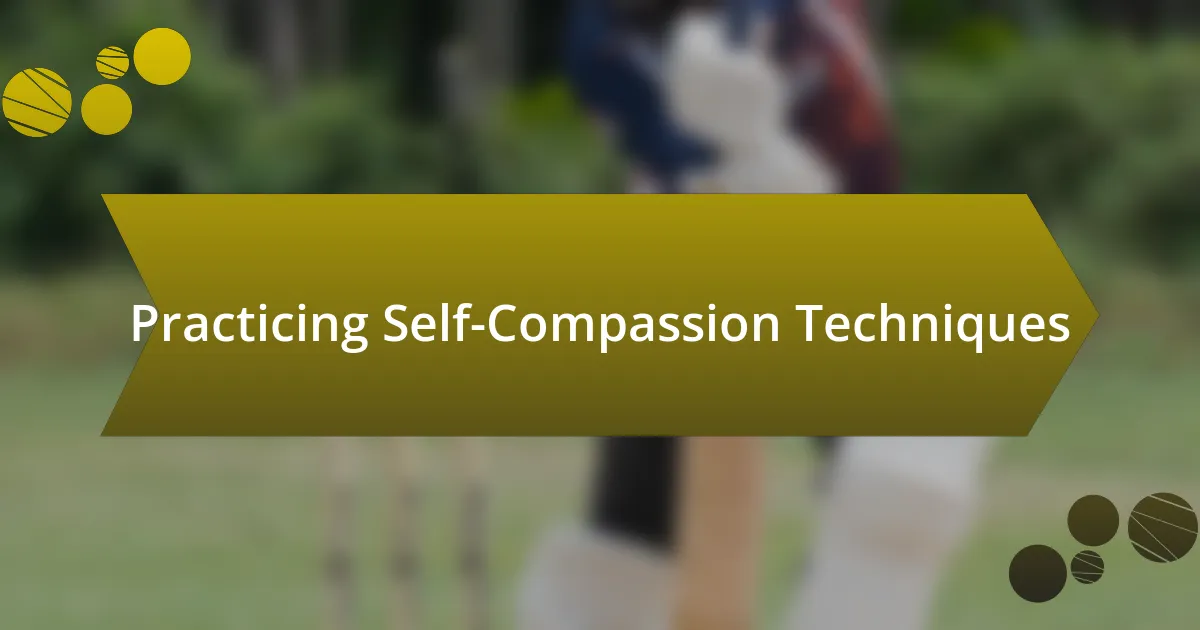
Practicing Self-Compassion Techniques
Practicing self-compassion has been a revelation in my mental health journey. Whenever I’m caught in a spiral of self-doubt, I remind myself to treat my feelings with the same kindness I would offer a friend. It’s amazing how a simple phrase like “It’s okay to feel this way” can ease the pressure I put on myself.
I vividly recall a time when I faced a significant setback at work. Instead of berating myself for not achieving my goal, I took a moment to recognize my effort and humanity. That shift in perspective helped me embrace my imperfections rather than hide from them. Have you tried acknowledging your feelings without judgment? It can be a game changer.
One valuable technique I find helpful is journaling my thoughts during tough times. As I write, I often notice the narratives that run through my mind and can respond to them compassionately. It feels like an intimate conversation with myself, allowing me to explore my emotions while nurturing a softer, loving approach that reinforces my worth, regardless of circumstances. This practice not only promotes self-acceptance but also fosters a profound connection to my inner self.










